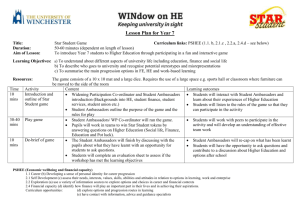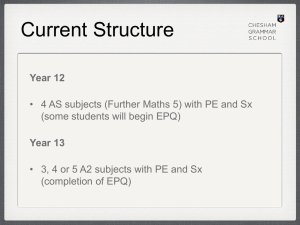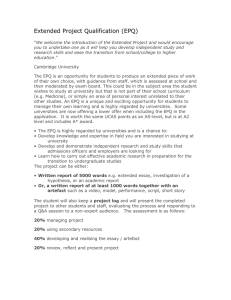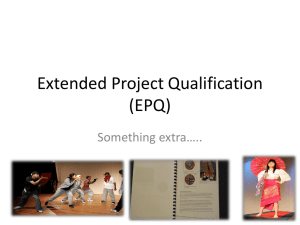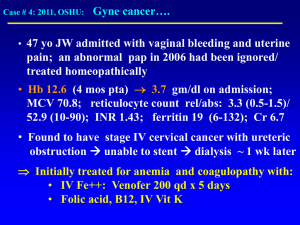Target Year Group: 12
advertisement
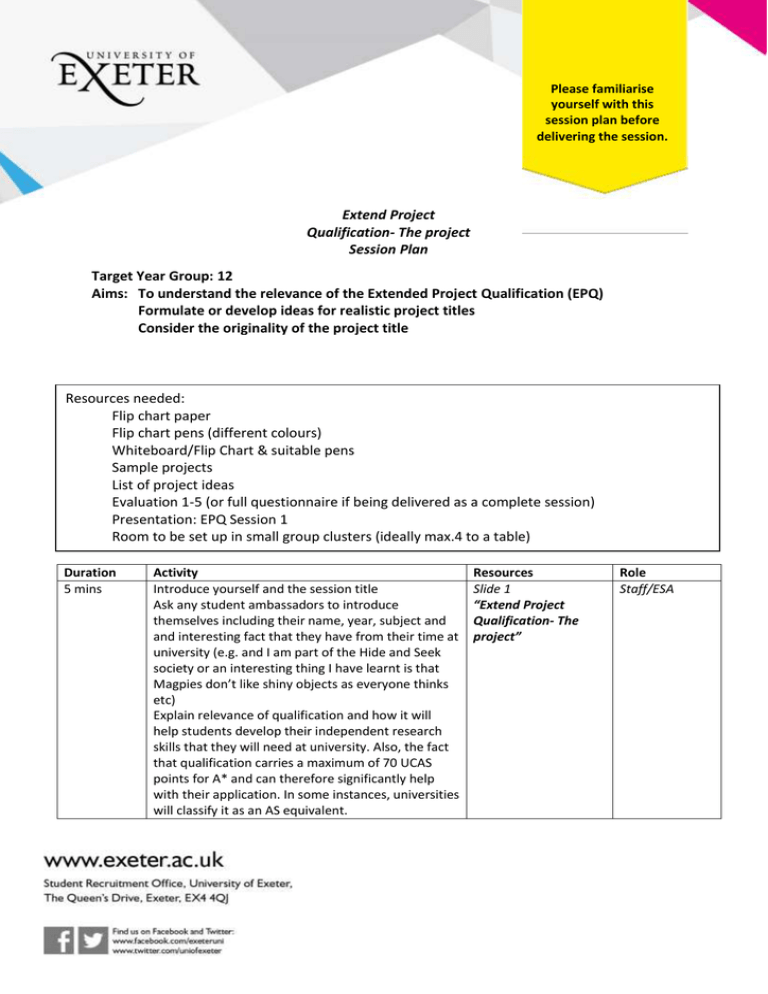
Please familiarise yourself with this session plan before delivering the session. Extend Project Qualification- The project Session Plan Target Year Group: 12 Aims: To understand the relevance of the Extended Project Qualification (EPQ) Formulate or develop ideas for realistic project titles Consider the originality of the project title Resources needed: Flip chart paper Flip chart pens (different colours) Whiteboard/Flip Chart & suitable pens Sample projects List of project ideas Evaluation 1-5 (or full questionnaire if being delivered as a complete session) Presentation: EPQ Session 1 Room to be set up in small group clusters (ideally max.4 to a table) Duration 5 mins Activity Introduce yourself and the session title Ask any student ambassadors to introduce themselves including their name, year, subject and and interesting fact that they have from their time at university (e.g. and I am part of the Hide and Seek society or an interesting thing I have learnt is that Magpies don’t like shiny objects as everyone thinks etc) Explain relevance of qualification and how it will help students develop their independent research skills that they will need at university. Also, the fact that qualification carries a maximum of 70 UCAS points for A* and can therefore significantly help with their application. In some instances, universities will classify it as an AS equivalent. Resources Slide 1 “Extend Project Qualification- The project” Role Staff/ESA 2-3 minutes 15 mins 10 mins This session will focus on formulating and developing project ideas. There will be lots of hands on activities to help students develop their own project ideas. Activity 1 Mind mapping topic ideas Activity 1a: 15 minutes: Using flip chart paper and coloured board marker, mind map ideas for a project title. This is an opportunity for students to explore their own topics/ideas. There is no wrong or right answer at this stage- just ideas! Ambassadors to circulate and help students with their ideas. Example project titles can be shown at this point to generate ideas and give students an idea of previous titles. Activity 1b: 10 minutes: Ask students to swap their paper/ideas with someone on their table and ask them to write on their suggestions and ideas in a different coloured pen. These should be extensions of original ideas or new ideas. Ambassadors to circulate and help students with their ideas. Activity 1c: 10 minutes: One person (at least, but could be more depending on time) from each group to feedback their project ideas to the rest of the whole group. Students and ambassadors can comment/make further suggestions. Any questions before we move onto the second part of the session? You may have a title for your project but a title does not a project make. It’s worth asking yourself the following questions relating to your planned project. The first one is arguably the most important. A title is a good starting point but you need to ensure that the associated data collection etc can be completed within the allotted time. Ensure that you can easily find out information about all aspects of your project. No good attempting to assess the severity of midge bites over the last 100 years only to find that no data exists before 1978. 2 Slide 2 “Aims and objectives” Staff/ESAs Slide 3 “Activity- Mind Mapping” Staff/ESA ESAs to hand out paper, pens and example EPQ titles. ESAs to circulate and talk to students as they do this task Slide 4 “The Project” Staff/ESA(s) 2 mins 2 mins The project cannot simply be descriptive, you have to be able to evaluate it in some way. So hopefully you now understand the benefit of doing the EPQ and have started to come up with some original ideas which you might want to develop further into your own project. Ask if any students have any questions or thoughts. If about Slide 5 “Conclusions “ Staff/ESA Slide 6 “Join the conversation” Staff/ESA DON’T FORGET! 3 You’ll need to collect feedback about this activity from the group so make sure it is included on the evaluation form’s list of activities or you use the presentation postcards to collect data when delivering off campus.
